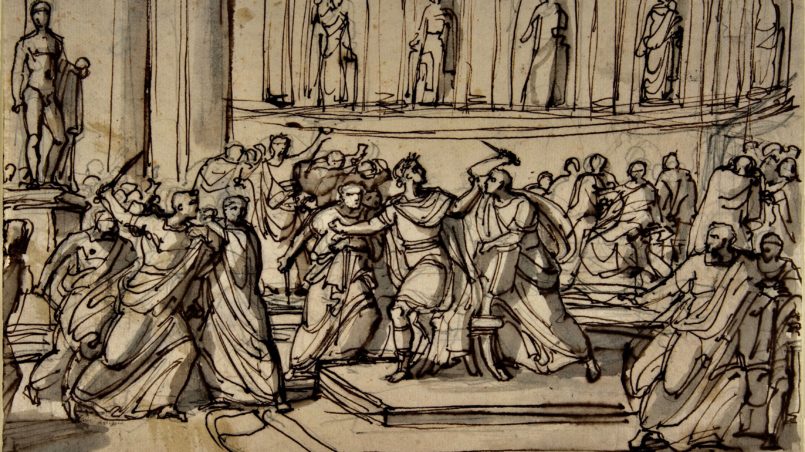Corporate “sponsorship” (a.k.a. money, goods, and services donated companies to non-profits in exchange for brand/logo placement, tax right-offs, and good press) is part of most arts organizations’ bottom line. Usually, it works like this: You get the money, spend that money, its never enough, and you hope the corporation gives you more next year. Refunds are rarely part of the equation.
But last week, two major funders, Delta Airlines and Bank of America, pulled out of The Public Theater’s Shakespeare in the Park production of Julius Caesar after pressure from the far right. Fox News, Breitbart and a host of other conservative media outlets were outraged over the portrayal and assassination in Act II of a tweeting, Trump-like Caesar. According to Delta, the production “crossed the line on the standards of good taste.” This begs the question: What is good taste, considering that the current occupant of the White House is a genital- grabbing bully that thinks a coat of gold paint makes anything classy?
American Express and the National Endowment for the Arts have distanced themselves from the play by releasing statements explaining that their contributions to The Public Theater were not used for the current production.
All these arbiters of good taste apparently missed the point of the play, which at its simplest says that violently attacking democracy, even when isn’t not working well, is a very bad idea.
The Public Theater will survive.
But the arts in the U.S. are taking another hit.
Corporate sponsorship of the arts amounts to almost a billion dollars a year, and that number doesn’t include the goods and services that companies like Delta donate. Bank of America is the largest cash donor to the arts. The company is a Founding Donor of the National Museum of African American History and Culture, and the bank’s CEO sits on the museum’s board of directors. Delta sponsors The Whitney Museum of American Art.
What happens the next time Fox News, Breitbart, and others have a problem with a piece of art? Or the time after that? What if this year, rather than last year, Laura Poitras had mounted her multimedia piece at The Whitney that explored mass surveillance, the war on terror, the U.S. drone program, Guantánamo Bay Prison, occupation, and torture?
When do cultural institutions start self-censoring?
Maybe not The Public.
Maybe not The Whitney.
Maybe.
But what about smaller cultural organizations that don’t have Alec Baldwin calling with offers of fundraising help? What message does this send to the up-and-coming theater company or the struggling museum? These are the places where emerging talent is supported and new audiences are nurtured. They are also much more fiscally vulnerable than institutions like The Public and The Whitney.
The donor relationship, both corporate and individual, is a tricky one. Ideally, donors are supporting cultural institutions as a whole, even if they are underwriting a specific project. “As an institution that believes in free speech for the arts as well as the media, we support the right of the Public Theater to stage the production as they chose,” read The New York Times statement about the current controversy.
You don’t have to like a piece for it to be important, relevant, or for it to contribute to the cultural conversation. There are much worse things to fund than thoughtful art. We’ve all seen horrible productions and exhibits. Is bad art really less offensive than good art that offends people? Nobody pulls funding because the play sucked.
I want corporate dollars to continue to flow into the arts. With the NEA under siege, we need this money more than ever. But I also want companies like Bank of America, Delta, and American Express to be responsible donors, not cultural gatekeepers dancing away from controversy. Financial support should not be subject to knee-jerk political pressure.
I am not willing to let the far-right (or the left) highjack the ethics of cultural funding.
If we want corporations to behave responsibly in their support of the arts, we have to let them know it matters to us, their customers. It’s easy to get fired up when we’re pissed off, but how about when we see an amazing play or sit in the park listening to the philharmonic or walk past the list of donors at an art exhibit?
Maybe it’s my Southern Baptist grandmother’s influence, but there’s an element of “you’ll catch more flies with honey than with vinegar” in all this for me. What I want to say to the Delta board of directors and CEO Edward H. Bastian is this: I’m proud of all the company has done to support the arts, but I’m very upset about their recent decision. So I decided to write the CEO and Board of Directors and tell them so.
Below is a copy of my letter, as well as contact information for the CEOs and Board of Directors of Delta Airlines, Bank of American, and American Express. I’ve included emails when I could find them.
I hope you’ll send your own letter or email expressing your support for funding the arts without caving to political pressure.
Feel free to steal whatever you like from my letter.
Edward H. Bastian, C.E.O.
Delta Air Lines, Inc.
P.O. Box 20706
Atlanta, Georgia 30320-6001Dear Mr. Bastian,
I have flown on Delta since I was a child, when it was still regional airline in the Southeast. I was therefore saddened by your decision to withdraw sponsorship from The Public Theater’s Shakespeare in the Park production of Julius Caesar. At a time when our country needs more open and thoughtful discussions, to publicly stand against an important artistic voice is not something that I can respect.
The point of supporting the arts is not to promote a specific political agenda or take issue with a single production. The point of supporting the arts is because art makes our world a better place. Art opens conversations. It tells us that 400 years ago, people were struggling with some of the same issues we are today.
I know that Delta supports many other cultural institutions. I hope that, in the future, you and Delta will continue to find it meaningful to fund these organizations for their broader value to our country and the world, rather some bending to people’s discomfort with specific pieces of art.
I would be proud to continue to support an airline that promoted art, rather than censorship.
Sincerely,
Maud Kersnowski Sachs
Delta Airlines: Board of Directors
Delta Air Lines, Inc.
P.O. Box 20706
Atlanta, Georgia 30320-6001
Edward H. Bastian, C.E.O. edward.bastian@delta.com
Francis S. Blake Frank_Blake@homedepot.com.
Daniel A. Carp
David G. Dewalt
William Easter
Mickey Foret
Shirley C. Franklin
Jeanne P. Jackson
GEORGE N. Mattson
Douglas R. Ralph
Bank of America: Board of Directors
100 N. Tryon St.
Charlotte, NC 28255
Brian T. Moynihan, C.E.O. brian.t.moynihan@bankofamerica.com
Sharon L. Allen
Linda P. Hudson
Susan S. Bies
Monica C. Lozano
Jack O. Bovender, Jr.
Thomas J. May
Lionel L. Nowell, III
Michael D. White
Pierre J. P. de Weck
American Express: Board of Directors
World Financial Center
New York, NY10285
Kenneth I. Chenault, C.E.O
Charlene Barshefsky, charlene.barshefsky@wilmerhale.com
John J. Brennan
Ursula M. Burns
Peter Chernin
Ralph de la Vega
Anne Lauvergeon
Michael O. Leavitt
Theodore J. Leonsis
Richard C. Levin
Samuel J. Palmisano
Daniel L. Vasella
Robert D. Walter
Ronald A. Williams


